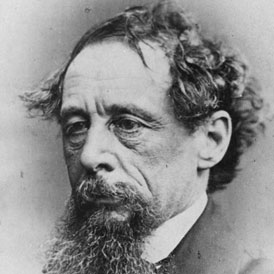What would Dickens write about if he were alive today?
As the bicentenary of Charles Dickens’ birth is celebrated, Channel 4 News looks at the themes he might include in his novels if he were writing in 2012.

In the 19th century, when Dickens was alive, there was no welfare state. If you were poor, there was no safety net in a modern sense. Benefits did not exist, but there was always the workhouse if you were destitute. You would be housed and fed, but it was a grim existence, as Oliver Twist found when he tangled with Mr Bumble.
Poverty and its evils was a theme Dickens explored in many of his novels, and there is no doubt it would preoccupy him if were writing today. Likewise the gap between rich and poor. At the time, Britain was the wealthiest and most powerful country in the world, but the uneven distribution of this wealth, and life’s chances, frustrated the author.
Dickens was a liberal with a social conscience; he was not a revolutionary. Karl Marx may have been impressed by the “political and social truths” in his works, but A Tale of Two Cities makes clear the writer’s distaste for the violence meted out to the aristocracy in revolutionary France. The lesson: the oppressed can soon become the oppressor.
Debt
Britain is in debt. Total debt has reached £1tr, the government is having to borrow billions of pounds every month to pay for public services (the budget deficit) and personal debt (much of it accounted for by mortgages) has rocketed.
There is no doubt that this would have been a theme Dickens would have explored if he were writing in 2012. His father John lived beyond his means and was sent to a debtors’ prison, the Marshalsea in London. The family’s financial misfortunes forced the young Charles to leave school and work 10-hour days in a factory.
His family’s experiences were the inspiration for his novel Little Dorrit, the tale of a girl whose father was imprisoned in the Marshalsea after going bankrupt.
As Time magazine explains, when Dickens started writing his book, several English banks collapsed and their owners were put on trial. In 2008, RBS and Lloyds had to be bailed out by the taxpayer. No-one has appeared in court, but bankers’ bonuses have become a hot political issue.

Bonuses
Under pressure from the government, RBS chief executive Stephen Hester agreed to waive the £1m bonus he was due. Chairman Sir Philip Hampton followed suit, giving up £1.4m. Former chief executive Fred Goodwin, who was in charge when the bank nearly went under, has been stripped of his knighthood.
Network Rail chief executive Sir David Higgins has also turned down a bonus of £336,000, and it is only a matter of time before someone else is leaned on to forgo a huge sum of money.
The controversy over pay and bonuses has been sparked by the fact that household incomes are falling, as a result of inflation, real-terms cuts in take-home pay, tax rises and reductions in public spending. The average Briton is becoming poorer, if not poor.
This gap between those earning the most and the rest of the population, particularly those earning the least, would have provided Dickens with some powerful source material.
Child poverty
Dickens was sentimental about children – Little Dorrit, Oliver Twist, David Copperfield etc – and was affronted by the suffering endured by the most vulnerable.
Child poverty was endemic in Britain when he was writing. Thanks to the welfare state, poverty is not what it used to be. But after years of decline, the Institute for Fiscal Studies says child poverty is destined to rise again because of changes to benefits and tax credits.
When Dickens was writing, there was little state support for the poor. He knew this because he had been through it himself. That is no longer the case, but after years of rising incomes and increased state support for families with children, he would have been a keen chronicler of the austerity Britain is going through at the moment.
Charles Dickens' aim was to improve society, writes Beverley Cook, curator of the Dickens exhibition at the Museum of London
Welfare cap
What would he have made of the government’s proposed welfare cap? This is an attempt to cap what a workless household on benefits can receive every year, so it is not given more than a family in work.
According to opinion polls, it enjoys public support. But critics say families with several children living in expensive parts of the country, where rents are high, will suffer.
The government’s own analysis says half of those who will be affected by the cap live in London, whose streets were Dickens’ main inspiration.
Campaigners say these people could be made homeless, with councils having to find them temporary accommodation in bed and breakfast hostels. The government says they will simply have to move to cheaper accommodation.
Whether Dickens would have agreed with the cap is anyone’s guess. But the journalist and novelist would have been on hand to write about this major social experiment in the making – using his combination of sentimentality, satire and humour.
